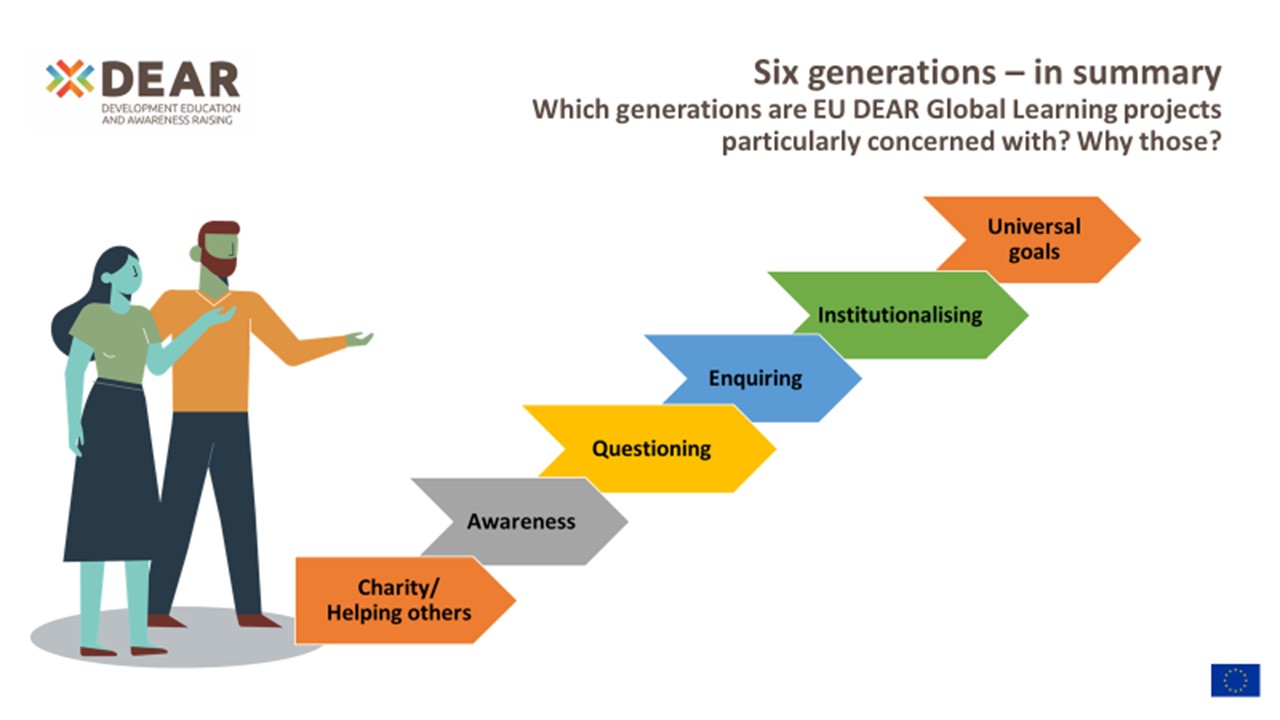Development Education: Some of the theory behind it all
News details

Academic thinking on global learning and development shapes the terrain where DEAR projects work. It can be helpful to understand some of this academic thinking and be able to recognise it’s influence in your own project work.
For example, Manuela Mesa Peinado is a Spanish pedagogical expert and the Director of the Education and Research Centre for La Paz (CEIPAZ). Some 20 years ago, she identified five generations of development education. You might recognize some of the continued impact these generations have in the running of your own DEAR project.
Below is a summary of the Manuela Mesa Peinado’s five generations, plus an additional sixth generation devised by Harm-Jan Fricke of the DEAR Support Team, that brings the timeline squarely into today’s Development Education environment:

Generation 1: Charity and Assistance
this generation began in the first half of the 20thcentury. Thinking is very much church-based and philanthropic with gifts of funds and immediate assistance to alleviate need and poverty
Generation 2: Development-ism and the emergence of ‘Development Education’
Origin in the 1960s and while initiated by churches and NGOs, this stage takes the economic view that less developed countries needed to emulate “the west”, develop industry and an economic base. The focus moves from just charity and helping people, to new ideas that people are poor as they are lacking certain skills or infrastructure.
Generation 3: A critical and solidarity based development education
By the 1970s, there is a growing criticism of past practice with more questioning of the euro-centric approaches to the so-called ‘Third World’. From here on, human rights, environment and cultural diversity issues start to play a larger role.
Generation 4: Human and sustainable development – and the emergence of Global Learning
Origin in the 1980s, NGOs move towards a notion of sustainable development amid a contest of war and conflict in much of the Middle East, central Asia and parts of Africa. Criticism of unfair systems and access to education and trading systems also begin to emerge.
Generation 5: Education for Global Citizenship
A decade later, in a post-cold war and increasingly globalised world, the thinking moves to a more ‘One world’ context. The local and global link is much stronger. Idea that while we are citizens of one country, we are also citizens of a global world and how we exercise that position is important in shaping development. Social studies curriculums in some European countries begin to add this social responsibility dimension to lessons.
Generation 6: Knowledge and skills needed to promote sustainable development
Post SDGs and building on Manuela Mesa Peinado’s thinking, we’re now in a sixth phase. The terrain has moved towards a value-based education approach with North and South education specialists coming together to look at the skills needed - and how we promote them to achieve sustainable development. The focus is expanding to incorporate a variety of issues and fuel progress towards the SDGs.
Just looking through this timeline, illustrates that global education practitioners are part of a dynamic and ever-changing process. It is important to understand this changing process and apply critical skills to understanding the international development terrain and the relationship between local and global development.
Thinking point: How have these approaches shaped your project?
This content is based on a session that took place in Helsinki on 5 November 2019 where the DEAR Support Team hosted a Learning and Development Hub for DEAR projects using formal and non-formal education to contribute to the SDGs.
DISCLAIMER: This article has been written by the DEAR Support Team to provide information about a project that receives European Commission support via the DEAR Programme. The article should not be interpreted as the official view of the Commission, or any other organisation.
/end
Log in with your EU Login account to post or comment on the platform.